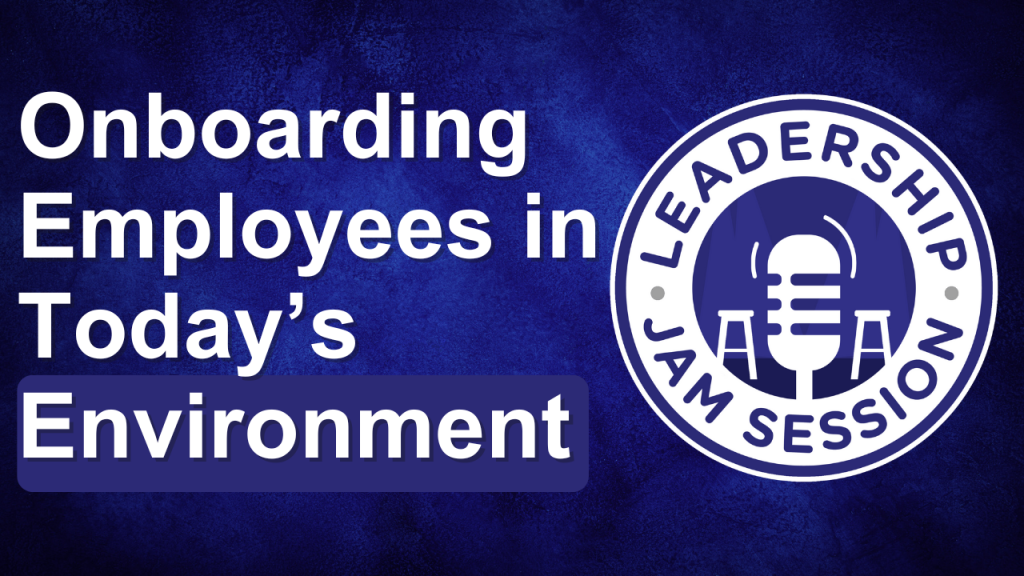How Can Leaders Successfully Onboard New Employees in a Virtual Environment?

Onboarding new employees has always been a crucial function for managers, but in today’s landscape, the virtual onboarding process introduces unique challenges. How do managers ensure new hires feel welcomed, informed, and supported when they’re not physically present? In a recent episode of the Leadership Jam Session podcast, experts James Christie and Ramahn Ritchie shared their strategies for successful virtual onboarding. Here are the key takeaways from their insightful discussion.
Understanding the New Employee Experience
Creating a Positive First Experience: James Christie, a director of a training group within the healthcare industry, emphasized the importance of thinking about the new employee’s first experience. Instead of jumping straight into a checklist of tasks, consider what information and feelings you want your new hires to have after their initial days. This thoughtful approach helps set a positive tone for the entire onboarding process.
Covering the Basics and Beyond: Both Christie and Ritchie discussed the need to present a comprehensive overview of the organization. This includes the company’s mission, vision, values, structure, and the specific responsibilities of the new role. Providing this broad context helps new employees understand their place within the organization and what is expected of them.
Structuring the Onboarding Process
A Long-Term Plan: Ritchie, an HR business partner in the security industry, recommends viewing onboarding as a 90-day process, broken down into three 30-day segments. In essence, it’s not just the first few days that count but a well-structured plan that extends over several weeks. This phased approach helps ensure that new employees are gradually and thoroughly integrated into their roles.
Sequestration for Focused Learning: One unique strategy discussed was “sequestration,” a term used by Christie. This involves giving new hires time and space to learn before they start engaging with other stakeholders. This approach reduces overwhelm and helps new employees build a solid foundation before diving into complex tasks.
Virtual Onboarding: Overcoming Unique Challenges
Intentional Engagement: In a virtual setting, managers need to be even more intentional about engagement. Christie mentioned virtual welcome breakfasts and regular check-ins as ways to replace the informal interactions that naturally occur in an office setting. These efforts help maintain a sense of community and connection.
Technology Readiness: A significant challenge in virtual onboarding is ensuring that new hires are comfortable with the necessary technology. Ritchie pointed out that simple issues like poor internet connections or malfunctioning cameras can cause delays and frustration. It’s vital to address these technical aspects proactively, advising new hires on what equipment they’ll need and ensuring they have a reliable setup.
Continuous Communication is Key
Texting for Quick Updates: One surprising insight from the podcast was the increased use of texting for quick, real-time updates. Both Christie and Ritchie noted that they communicate more frequently with their teams via text, which wasn’t as common before the pandemic. This method can help maintain high levels of communication, even when face-to-face meetings aren’t possible.
Setting Clear Expectations: Both guests agreed that setting clear expectations is crucial. This includes sharing your management style, what you expect from employees, and what they can expect from you. This clarity helps new hires feel more secure and understand how to navigate their new roles.
Leveraging Team Expertise
Encouraging Peer Support: Christie emphasized the importance of connecting new hires with other team members who can offer support and expertise. This not only helps distribute the onboarding workload but also fosters a sense of community and belonging. New employees may feel more comfortable asking questions to their peers rather than their manager, easing their transition into the organization.
Adapting to the New Normal
Being Cognizant of Individual Needs: Understanding that everyone has different levels of comfort and engagement is vital, especially in a virtual environment. Some employees may thrive with more autonomy, while others might need more frequent interactions. Adapting your approach to meet these needs can make a significant difference in their onboarding experience.
Ongoing Development: It’s important for organizations to recognize that the shift to virtual work isn’t temporary. As Christie pointed out, many companies will continue to implement remote work policies post-pandemic. Therefore, managers should aim to become proficient in virtual onboarding and continuously refine their strategies.
Conclusion: Back to Basics
While virtual onboarding presents new challenges, the fundamental principles remain the same: thorough planning, clear communication, and continuous support. By being intentional and adaptable, managers can ensure that new employees feel welcomed, informed, and integrated, setting them up for long-term success. By focusing on the essentials and leveraging technology effectively, leaders can turn the virtual onboarding process into a seamless and positive experience.
Key Takeaways
Key Takeaways
– The importance of setting a positive first experience for new hires (00:01:32)
– Breaking onboarding into 30, 60, and 90-day phases for effective acclimation (00:03:21)
– Managing stakeholder expectations to protect new employees’ time and focus (00:05:01)
– Adapting engagement strategies for virtual onboarding, such as virtual meet-and-greet sessions (00:08:50)
– Leveraging team members as additional resources for new hires (00:18:40)
James and Rahman stress that onboarding virtually requires intentionality and adaptability. Their insights remind us that planning, structured support, and clear communication are essential for setting new employees up for success.
Leadership Resources
How are the leaders at all levels of management tackling the toughest challenges each day? Learn more at: https://sartoleadershipgroup.com

